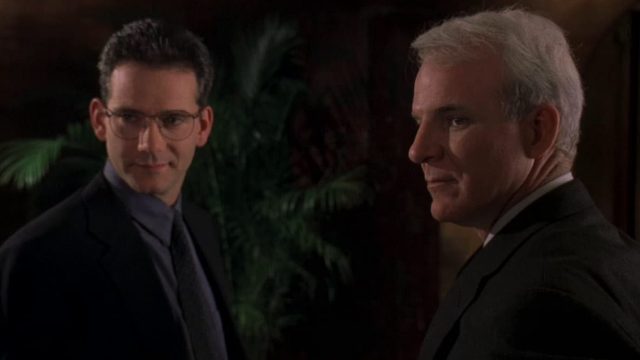Sleek, cool, and composed, The Spanish Prisoner depends on getting every detail precisely right. It does.
The first time through, the early stages of the movie ought to feel slow, but they don’t. Even before you have a full grasp of the subterranean plot developments, you’re watching something interesting in its own right: how the world reacts to Campbell Scott’s Joe. Joe–the “boy scout,” as his coworkers call him–could be a cardboard cut-out of an earnest schmuck, but both Scott and David Mamet invest him with more particularity than that, and with more surreal strangeness, too. There’s an old saw that you can never con an honest man, that the success of a con hangs on a mark’s greed. Joe tests that theory. Money is only a symbol of what he really wants: respect.
The money itself … well, as he says, it’s “useful if you want to buy things.” He doesn’t hoard it. But he has to be prodded to indulge himself, and when we do see him spend money, it’s mostly on gifts: upgrading a company secretary to first-class, replacing a book he’s damaged, buying a get-well present for a woman he’s never met. Gifts are relationship-driven, and so is Joe. The gesture’s value is an answer to the implied question: What do you really think of me? That’s Joe’s native language: cleverly coded sincerity. He’s a genuinely good man, but that doesn’t make him a simplistic one. He’s profoundly vulnerable to what people–especially people he unconsciously thinks of as his “betters,” like his boss and millionaire Jimmy Dell–think of him; a discerning courtship means the world to him, while a slight makes him even angrier than a personal betrayal.
Watching the emergence of Joe’s characterization is part of the appeal of the movie’s first half. He has an almost superhero-like quality to him: a man determined to embody his ideals even at the expense of his own personality. (When he says “we used to say [you should marry] a nymphomaniac who owns a liquor store,” it’s an almost jarring insight into his much-less-formal past; back story is bullshit, as Mamet himself says, but not when it’s done like this.)
We have to figure out Joe, and so does everyone else. When Jimmy Dell (Steve Martin) offers Joe a thousand dollars for his camera, to cover up a picture he’s just taken, Joe gets offended: he’ll grant a favor, even for a stranger, but he won’t take a bribe. It’s one of the key scenes in the film, establishing several things in rapid succession: Joe’s priorities–both what he wants and what will outrage him–Dell’s reflexive approach, and Joe’s disinterest in suspicion. He’s naïve to the point of being unimaginative–or unimaginative to the point of being naïve. It tells the movie’s movers-and-shakers how they’ll have to handle him, and they handle him extraordinarily well.
I’ll leave out much discussion of the plot, because this richly rewards a spoiler-free viewing (and then richly rewards a rewatch), but no discussion of any Mamet movie would be complete without talking about the language. The cast, in this case, is completely at home with it: Campbell Scott, Rebecca Pidgeon, Steve Martin, and Ricky Jay in particular all sound at home with this kind of abstracted, precisely formed dialogue. Martin gets maybe the finest line of it, delivered with an almost crystalline clarity: “I think you’ll find that if what you’ve done for them is as valuable as you say it is, if they are indebted to you morally but not legally, my experience is they will give you nothing, and they will begin to act cruelly toward you.” The lack of contractions in the second half of that sentence is an art-form in its own right. Pidgeon’s lines are also crafted particularly well and with a hard-edged whimsy, like she’s a Manic Pixie Dream Girl seen through a glass darkly: “My troika was pursued by wolves,” she says, and, “When you own the company, can I be queen?” She also gets one of the best acting moments in the movie, when you see her face change subtly but completely in response to something Joe has just said.
Not only well-worth watching, but well-worth watching more than once.

